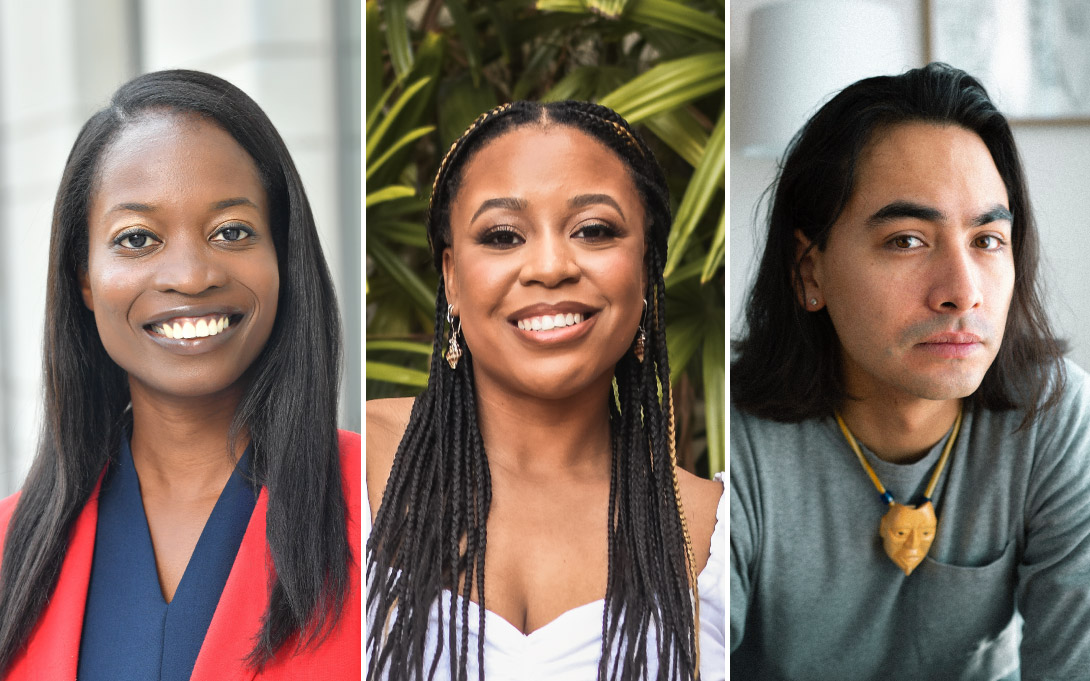CRJ Visiting Fellows Spring Showcase
Speaker
Atinuke Adediran, Makeda Easter, Julian Brave NoiseCatDate & time
Location

On Thursday, March 30 at 4pm, the Center for Racial Justice invites you to attend our CRJ Visiting Fellows Spring Showcase featuring the work of our inaugural cohort of visiting fellows: sociologist and legal scholar, Dr. Atinuke (Tinu) Adediran; freelance journalist, Makeda Easter; and writer and filmmaker, Julian Brave NoiseCat. Fellows will present their racial justice catalyst projects to the U-M community, followed by remarks from U-M community members: Vikramaditya S. Khanna (U-M Law), Srimoyee Mitra (U-M Stamps), and Forrest Cox (BA '13 and U-M Ross). A post-event reception will be held in the Rebecca M. Blank Great Hall. Please register here!
About the fellowship
The Visiting Fellows Program is a non-residential fellowship and signature initiative of the Center for Racial Justice that hosts social justice leaders, activists, artists, advocates, and scholars a prestigious, highly competitive fellowship designed to recognize their transformative work to date and provide opportunities to advance their future endeavors.
Meet our fellows
Atinuke (Tinu) O. Adediran is an associate professor of Law at Fordham University School of Law who researches and writes about inequality in nonprofits, corporations, and law firms. Her work centers on how the law influences these institutions, how they influence the law, and how to use the law to affect change toward racial, gender, and other forms of equity within and outside of these institutions. Her catalyst project is her monograph, Disclosureland: How America’s Largest Companies Construct Their Public Image and Discount People of Color, which identifies and examines a type of affirmative action spurred by 2020’s racial reckoning that differs from federal affirmative action and is inherent to companies. Disclosureland holds as its premise that corporate affirmative action puts the financial goals of a company at the center of these disclosures and choices while also being a form of racial oppression that burdens communities of color. Using Chevron and Amazon as case studies, the book argues that corporate affirmative action benefits companies much more than communities of color and can even harm racial equity goals by deprioritizing corporate action that adversely affects communities of color or disregarding claims of racial discrimination that arise from corporate behavior.
Makeda Easter is an award-winning journalist whose work has appeared in the Los Angeles Times, KCET, Dance Magazine, Austin Chronicle, Chemical & Engineering News, and more. The Center for Racial Justice will support Easter’s catalyst project, the art rebellion, an independent digital publication focused on artists-activists in underreported regions and communities. Inspired by disparities in current art coverage, she envisions the platform will “emphasize the importance of artists in creating social change and empower artists through service journalism to make a living and impact through their work.” Easter also hopes the project will “transform arts reporting, [by] decentralizing New York and L.A. and the wealthiest art institutions, and instead spotlight radical and resistance art in small and mid-sized cities.” Her fellowship is co-sponsored by the Knight-Wallace Journalism Fellows Program.
Julian Brave NoiseCat is an Indigenous (Secwepemc/St’it’limix) writer, filmmaker, and activist who works at the intersection of climate journalism and advocacy for indigenous rights. NoiseCat's work has been recognized with numerous awards including the 2022 American Mosaic Journalism Prize, which honors "excellence in long-form, narrative or deep reporting on stories about underrepresented and/or misrepresented groups in the present American landscape." In 2021, he was named to the TIME100 Next list of emerging leaders for his work at the center of the climate crisis. As a Visiting Fellow, NoiseCat will complete his first book, We Survived the Night, as well as work on his documentary film that he is co-directing with Emily Kassie. With this support, he hopes that the projects will, “shift the conversation and help policymakers and the public better understand the history, struggle and ongoing vitality of Indigenous peoples in both the United States and Canada.”
Read more about the fellows here.